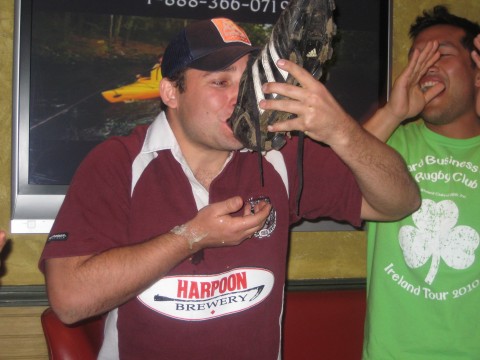
Some New Englander shootin' the boot.
Lately I have been hearing a lot of talk about initiation rituals. Most of it comes from the mouths of non-athletes and implies a negative attitude toward their practice.
Ultimately, I cannot pretend to be unbiased in my reporting, because I only had the opportunity to interview athletes and not their critics; indeed, it is very hard to find people who are willing to go on record criticizing teams or groups on such a small campus as ours. Since I myself have no criticisms for our athletes or their behavior, I cannot claim to validly report on the other side of this issue. All I can do is speculate about my perception of criticisms going on.
That being said, I think the disapproval of team initiation rituals stems from two main types of judgments: (1) Worries about hazing and (2) Resentment of drunk people’s behavior.
I sat down with one lacrosse player, who requested his name be withheld, to discuss these issues. He told me, “In every situation, freshmen have the choice to participate in initiation, and/or to drink. Membership on the team is not contingent upon that choice.”
“After choosing to participate, can you opt out?” I asked him.
“You can choose to say ‘I’ve had enough,’ and you won’t be looked down upon.”
He also pointed out that very few groups on campus do not hold some form of social drinking or initiation ritual.
His point may be a valid one. As I have been told (and my knowledge is limited), the a cappella groups bring their initiates through far more bizarre routines than the sports teams. My sophomore year, I watched freshmen be blindfolded and brought into a blue lit room with eerie music playing. I don’t know what happened behind that door, but that freshman’s experience, to me, seemed a bit more uncomfortable than the experience of a freshman soccer player giving himself a mohawk.
In any event, as my interviewee pointed out, “These experiences are often looked back on as ‘the good times’ by 90% (or more) of their participants.”
A freshman on the club soccer team told me that “team shenanigans” (as I called them) build unity. He recounted his experience with team initiation. “People drank. It was optional, but a lot of people showed up. It was a low-pressure environment.”
Most athletes I have informally discussed the subject with agree with the above responses. In fact, only one athlete said that there might be even the remotest chance of “a stigma attached to someone who does not participate in team rituals”; otherwise, he was in favor of their practice.
So why then do we perceive so much criticism?
I maintain that it’s because there’s a lot out there. Most of the criticism I overhear is between friends sitting in dining halls, whispering back and forth, or in rooms with narrowly-open doors. In sum, they are private situations.
The pre-Socratic philosopher Heraclitus once said that “Dogs bark at everyone they do not know.” His point: Ignorance breeds aggression. And while that aggression may be passive and non-confrontational in nature, who — of the judgmental lot of us — is to doubt that it exists?
So all the freshmen on the soccer team have mohawks, so what? Does this affect us? Does this threaten us in some way?
No.
Let us consider for a moment who tells these negative stories we hear. Who exaggerates the activities of the athletic community to a point where impartial observers start judging their behavior?
If no one else, I think it’s the small number of people who don’t have their own stories to talk about.
It would be very hard to take the biography of Heraclitus and appropriate it into everyday conversation—only a true intellectual like myself can do that! However, his statement might beguile your mind into thinking that you can’t make small talk with those around you.
A much easier alternative for someone in that tragic position, however, is to relate to others on the basis of gossip. It is easier, but void of any real relationship or esteem building. This is because judging the actions of other people offers a shared common experience, one that is ultimately grounded in one’s opinion about the life of another. Unfortunately, it is not grounded on a shared experience between himself and the other person present.
I think that the real reason people judge athletes for their team shenanigans is the sense of loneliness or inferiority any of us feels during moments of isolation. In moments when we feel like an outsider, see others having fun, and feel excluded, we get jealous, then resentful—then angry—then possibly depressed— and consequently judgmental.
That being said, I think there are a fair number of judgmental people on this campus, athletes and non-athletes alike.









